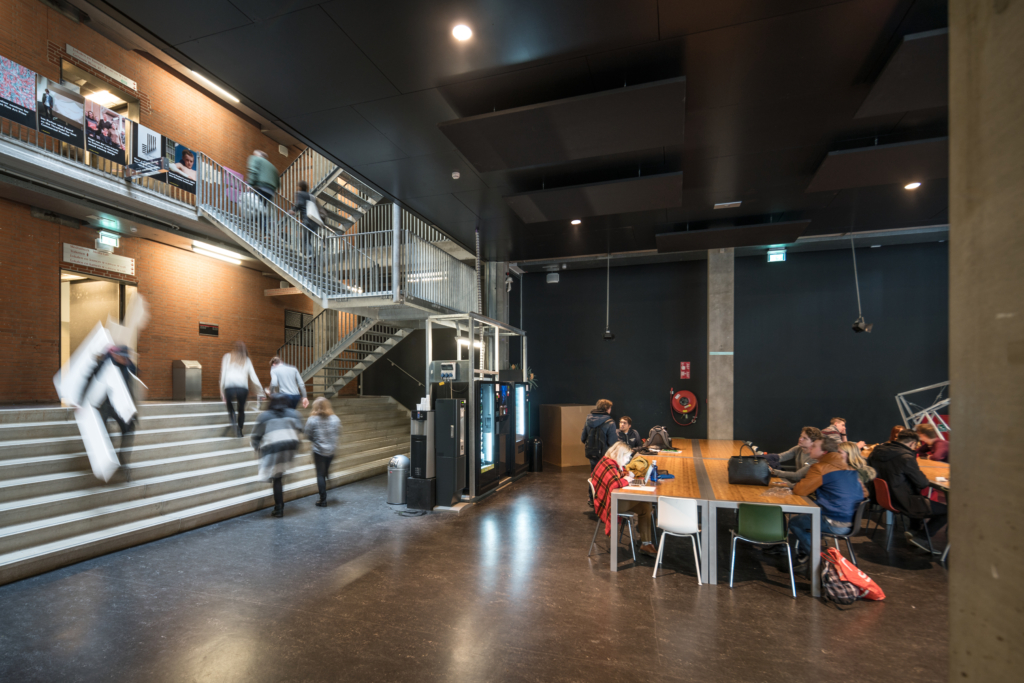You can find Willem de Kooning Academy right at the heart of the design city of Rotterdam. The academy is part of the multi-sectoral Rotterdam University of Applied Sciences (RUAS for short). RUAS is a dynamic knowledge institute for higher professional education.
Education
Today, artists and designers face challenges such as climate change, migration, and inequality. These are not just topics to study— they are reshaping how artists, designers, and educators work and create. We are committed to make a positive impact by working creatively and collaborativelly with the professional field. In doing so, we enable our students to navigate ever-changing contexts, technologies and infrastructures with confidence. Whichever Bachelor’s programme you choose, you'll have the opportunity to explore different mediums, techniques, Stations (Workspaces), and to work on inspiring interdisciplinary projects.
Stations (workspaces)
Most of your study activities will take place at the Stations (Workspaces). All students, regardless of their bachelor programme or year, are welcome to use them. The Stations are places where you can test your ideas and figure out how to turn them into fully functioning creations. Experiment with tools, techniques, materials, and equipment. Get support and inspiration by working with fellow students, tutors and instructors.
For more detailed information about our Stations, please visit wdka.nl/stations
International Classroom
Willem de Kooning Academy presents itself as an international art academy. Every year, a large number of exchange students come to the academy and academy students go abroad for study or internship. An international composition of the student population leads to more developed intercultural skills and improves understanding of different countries and cultures, which is one of the reasons for the academy to pursue further growth in the number of international students.
Our academy sees a clear added value of an "international classroom": this contributes to the international profile of the academy and enhances its reputation, which facilitates the recruitment of international talent. Another reason is that contemporary professional field requires professionals with international competencies or the 21st-century skills. Even if the student has no ambition to work in a foreign country, those skills are essential. Needless to say, it is also essential that tutors have or develop these skills, whether through training or guest lectureship at one of our partner schools. For students, there are optional modules available to brush up their English.
To facilitate the integration of international students, WdKA has decided to change all courses into 'full' English education as from September 2016*. It is important to note that the English language is not a goal but a means. At the start of the first year of study the student will have to do an assessment in English and if the grade is insufficient, the student will be obliged to take extra classes to bring command of English to a satisfactory level (B2).
The following agreements have been made regarding the languages :
- All communication by supporting staff will be done in English (or Dutch and English).
- All group meetings with students will be in English, as soon as an international student is present in the class.
- In case of individual feedback/review, one can switch to Dutch.
- Papers/essays and reports can be submitted either in English or Dutch, in close consultation with the tutor.
- If required, tutors can, in consultation with their supervisor, take English classes.
* Except Leisure & Events Management and Fine Art en Design Teacher Training.
Ah, the creative process is the same secret in science as it is in art. They are all the same absolutely.
Social Safety at WdKA
In order for students and staff to fully focus on their studies and enjoy their study time at the WdKA, social safety is a prerequisite. The WdKA is committed to a rich study climate that is inclusive and diverse, and where safety for all is guaranteed.
To ensure this, various measures have been taken:
- An updated Code of conduct
- Study Career Coaches
- Office for Inclusivity
- Vitality coach
- Student welfare staff (Rotterdam University of Applied Sciences)
- Counsellors (Rotterdam University of Applied Sciences)
- An updated Complaints procedure
- Confidential officer for students and a confidential officer for employees (WdKA and Rotterdam University of Applied Sciences)
- Confidential officer specifically in the area of inclusiveness (Rotterdam University of Applied Sciences).
- WdKA joins Mores.nl, the independent platform for complaints regarding safety and integrity in the arts.
Students and staff can find all information on the internal platform Mywdka.nl.

The Academy
Since 1998, we proudly carry the name of one of most famous alumni. Willem de Kooning Academy is conveniently located at Blaak 10 and Wijnhaven 61, two adherent buildings connected with an airbridge. The beautiful Blaak 10 has always been regarded as the ‘home base’ of the academy. Due to expansion and an increasing student population, the Wijnhaven 61 building was assigned to the academy in 2007.
WdKA hall, photography, Ossip van Duivenbode